-
 Bitcoin
Bitcoin $114400
1.32% -
 Ethereum
Ethereum $3499
2.20% -
 XRP
XRP $2.922
4.26% -
 Tether USDt
Tether USDt $0.0000
0.03% -
 BNB
BNB $752.6
1.53% -
 Solana
Solana $161.8
1.64% -
 USDC
USDC $0.9999
0.01% -
 TRON
TRON $0.3267
1.32% -
 Dogecoin
Dogecoin $0.1991
3.02% -
 Cardano
Cardano $0.7251
3.29% -
 Hyperliquid
Hyperliquid $38.32
3.36% -
 Stellar
Stellar $0.3972
7.58% -
 Sui
Sui $3.437
2.74% -
 Chainlink
Chainlink $16.29
3.65% -
 Bitcoin Cash
Bitcoin Cash $545.3
3.70% -
 Hedera
Hedera $0.2482
7.49% -
 Ethena USDe
Ethena USDe $1.001
0.03% -
 Avalanche
Avalanche $21.40
2.02% -
 Toncoin
Toncoin $3.579
1.56% -
 Litecoin
Litecoin $109.3
2.20% -
 UNUS SED LEO
UNUS SED LEO $8.951
-0.18% -
 Shiba Inu
Shiba Inu $0.00001220
2.75% -
 Polkadot
Polkadot $3.613
2.99% -
 Uniswap
Uniswap $9.173
3.78% -
 Monero
Monero $302.6
2.62% -
 Dai
Dai $0.0000
0.00% -
 Bitget Token
Bitget Token $4.320
1.52% -
 Pepe
Pepe $0.00001048
3.40% -
 Cronos
Cronos $0.1314
4.33% -
 Aave
Aave $259.4
3.54%
Are the transaction costs of a Bitcoin ETF high?
Transaction costs for Bitcoin ETFs differ based on factors like platform, order type, and trade size; they tend to be higher compared to stocks and bonds due to lower liquidity and higher regulatory requirements.
Oct 19, 2024 at 05:54 pm
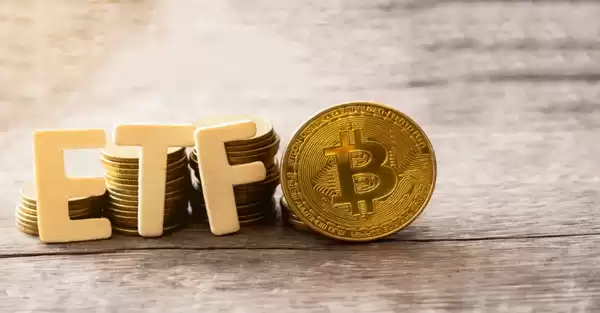
Are the Transaction Costs of a Bitcoin ETF High?
1. Understanding Bitcoin ETFs
Bitcoin exchange-traded funds (ETFs) are financial instruments that track the price of Bitcoin without requiring investors to buy and store the cryptocurrency directly. They provide a convenient and regulated way to gain exposure to Bitcoin.
2. Transaction Costs of Bitcoin ETFs
Like any other investment, Bitcoin ETFs incur transaction costs. These costs vary depending on the exchange or platform where the ETF is traded.
3. Factors Affecting Transaction Costs
Several factors影響 transaction costs for Bitcoin ETFs:
- Trading Platform: Different trading platforms have different fee structures.
- Order Type: Market orders typically have lower fees than limit orders.
- Market Liquidity: Higher market liquidity leads to lower transaction costs.
- Trade Size: Larger trades generally incur higher costs due to regulatory requirements.
4. Comparison with Other Assets
Compared to other financial instruments, the transaction costs of Bitcoin ETFs are generally higher.
- Stocks: Stocks typically have lower transaction costs due to higher market liquidity and lower regulatory requirements.
- Bonds: Bonds also have lower transaction costs, especially for larger trade sizes.
- Mutual Funds: Mutual funds may have higher transaction costs than Bitcoin ETFs but offer a broader range of investments.
5. Specific Examples of Transaction Costs
The transaction cost of a Bitcoin ETF varies widely depending on the platform and order type. Here are some specific examples:
- Grayscale Bitcoin Trust (GBTC): Charges a hefty 2% annual management fee, which adds to the transaction costs.
- ProShares Bitcoin Strategy ETF (BITO): Has an expense ratio of 0.95%, significantly lower than GBTC but still higher than many stock ETFs.
- Valkyrie Bitcoin Strategy ETF (BTF): Has an expense ratio of 0.75%, among the lowest for Bitcoin ETFs.
6. Considerations for Investors
Investors considering Bitcoin ETFs should carefully consider the transaction costs and compare them to other investment options. High transaction costs can eat into returns over time.
Conclusion
The transaction costs of Bitcoin ETFs can vary significantly depending on various factors. While they are generally higher than those of other financial instruments, several cost-effective ETFs are available. Investors should carefully consider the transaction costs before investing in a Bitcoin ETF to maximize their returns.
Disclaimer:info@kdj.com
The information provided is not trading advice. kdj.com does not assume any responsibility for any investments made based on the information provided in this article. Cryptocurrencies are highly volatile and it is highly recommended that you invest with caution after thorough research!
If you believe that the content used on this website infringes your copyright, please contact us immediately (info@kdj.com) and we will delete it promptly.
- Altcoin Rotation, Smart Money, and Investment Trends: What's the Deal?
- 2025-08-04 12:30:11
- Crypto, Pi Network, Movement: Is Pi Coin the Next Big Thing?
- 2025-08-04 12:30:11
- Bitcoin, Metaplanet, and Institutional Confidence: A New Era?
- 2025-08-04 12:50:12
- XRP Price, Ripple CTO, and Tokenized Finance: A New York Minute on Crypto
- 2025-08-04 12:50:12
- Pi Coin: Future Access or Early Adoption Blues?
- 2025-08-04 12:55:11
- Ethereum Liquidations Rock Crypto Market: What's a New Yorker to Do?
- 2025-08-04 13:00:17
Related knowledge
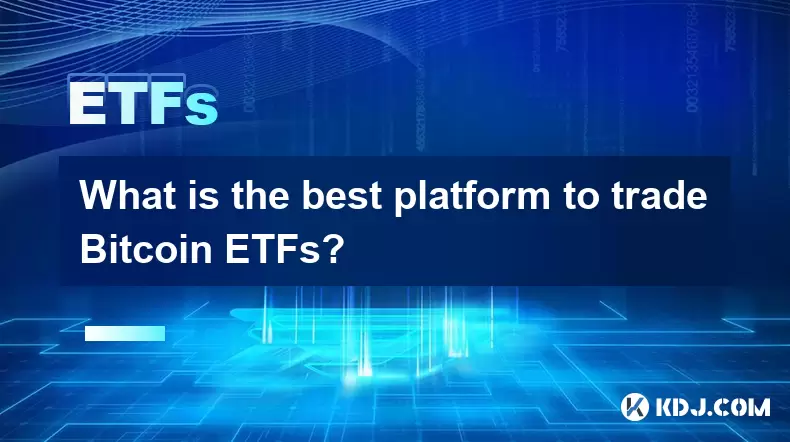
What is the best platform to trade Bitcoin ETFs?
Jul 23,2025 at 04:14am
Understanding Bitcoin ETFs and Their Role in TradingBitcoin Exchange-Traded Funds (ETFs) have gained significant traction among traditional and crypto...
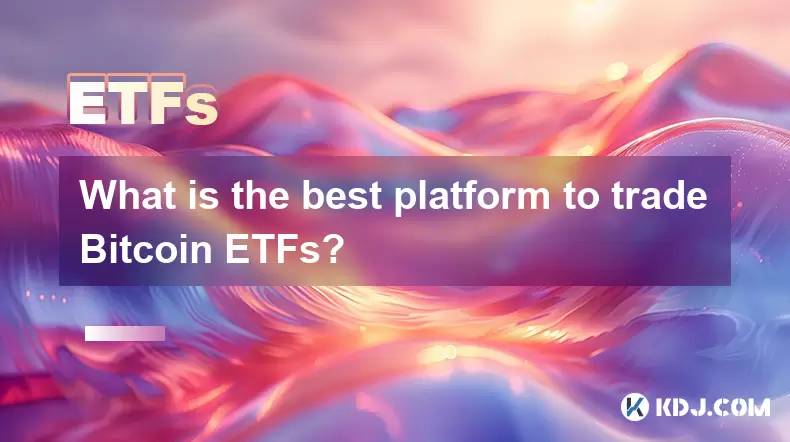
What is the best platform to trade Bitcoin ETFs?
Jul 17,2025 at 03:50pm
Understanding Bitcoin ETFs and Their Role in the MarketBitcoin Exchange-Traded Funds (ETFs) are investment vehicles that track the price of Bitcoin wi...
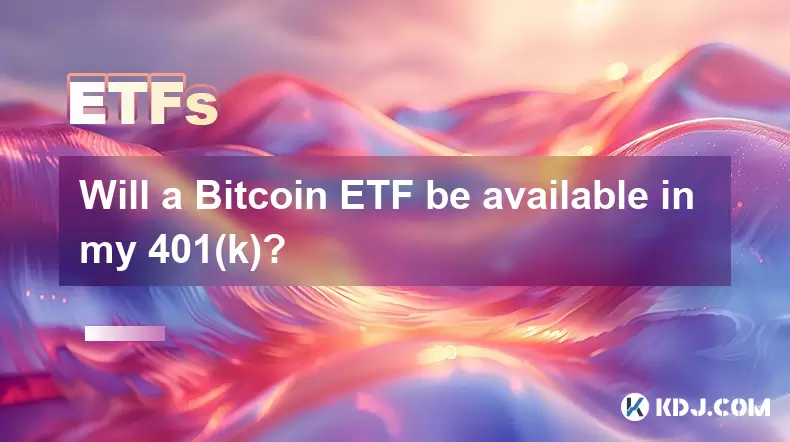
Will a Bitcoin ETF be available in my 401(k)?
Jul 17,2025 at 10:42pm
What is a Bitcoin ETF?A Bitcoin ETF (Exchange-Traded Fund) is an investment vehicle that tracks the price of Bitcoin without requiring investors to di...
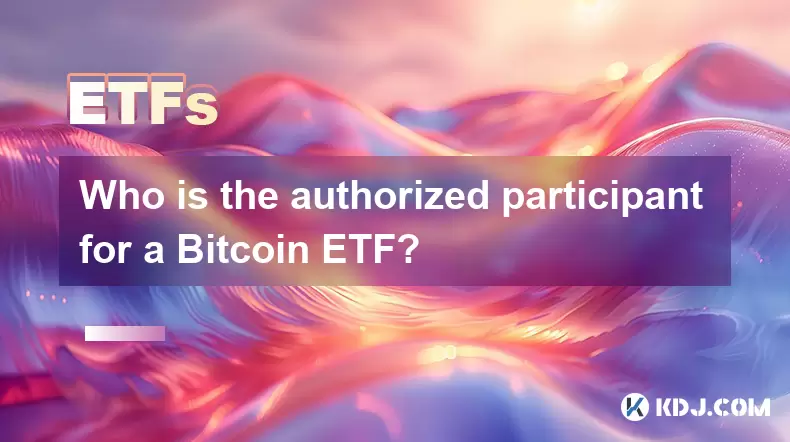
Who is the authorized participant for a Bitcoin ETF?
Jul 18,2025 at 12:42am
Understanding the Role of Authorized Participants in Bitcoin ETFsIn the context of Bitcoin Exchange-Traded Funds (ETFs), an authorized participant (AP...
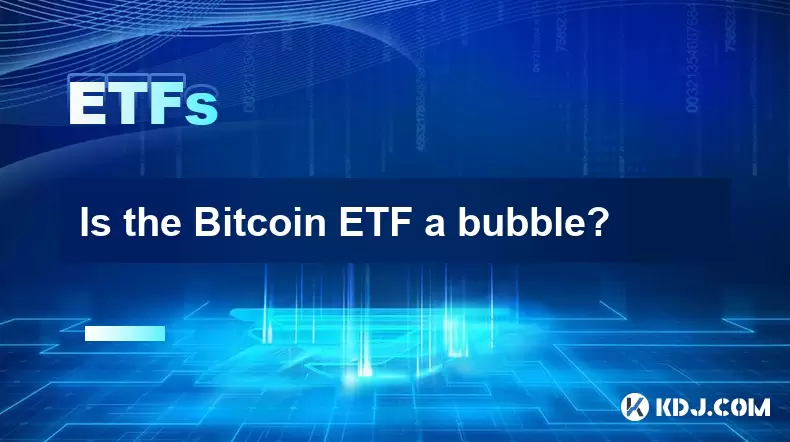
Is the Bitcoin ETF a bubble?
Jul 20,2025 at 06:57am
Understanding the Bitcoin ETF ConceptA Bitcoin Exchange-Traded Fund (ETF) is a financial product that aims to track the price of Bitcoin without requi...
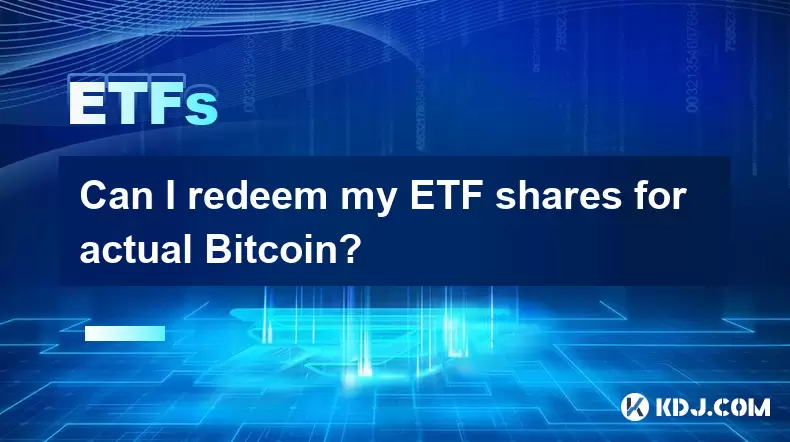
Can I redeem my ETF shares for actual Bitcoin?
Jul 17,2025 at 03:14pm
Understanding ETF Shares and Their Relation to BitcoinExchange-Traded Funds (ETFs) have become a popular investment vehicle for those looking to gain ...

What is the best platform to trade Bitcoin ETFs?
Jul 23,2025 at 04:14am
Understanding Bitcoin ETFs and Their Role in TradingBitcoin Exchange-Traded Funds (ETFs) have gained significant traction among traditional and crypto...

What is the best platform to trade Bitcoin ETFs?
Jul 17,2025 at 03:50pm
Understanding Bitcoin ETFs and Their Role in the MarketBitcoin Exchange-Traded Funds (ETFs) are investment vehicles that track the price of Bitcoin wi...

Will a Bitcoin ETF be available in my 401(k)?
Jul 17,2025 at 10:42pm
What is a Bitcoin ETF?A Bitcoin ETF (Exchange-Traded Fund) is an investment vehicle that tracks the price of Bitcoin without requiring investors to di...

Who is the authorized participant for a Bitcoin ETF?
Jul 18,2025 at 12:42am
Understanding the Role of Authorized Participants in Bitcoin ETFsIn the context of Bitcoin Exchange-Traded Funds (ETFs), an authorized participant (AP...

Is the Bitcoin ETF a bubble?
Jul 20,2025 at 06:57am
Understanding the Bitcoin ETF ConceptA Bitcoin Exchange-Traded Fund (ETF) is a financial product that aims to track the price of Bitcoin without requi...

Can I redeem my ETF shares for actual Bitcoin?
Jul 17,2025 at 03:14pm
Understanding ETF Shares and Their Relation to BitcoinExchange-Traded Funds (ETFs) have become a popular investment vehicle for those looking to gain ...
See all articles

























































































